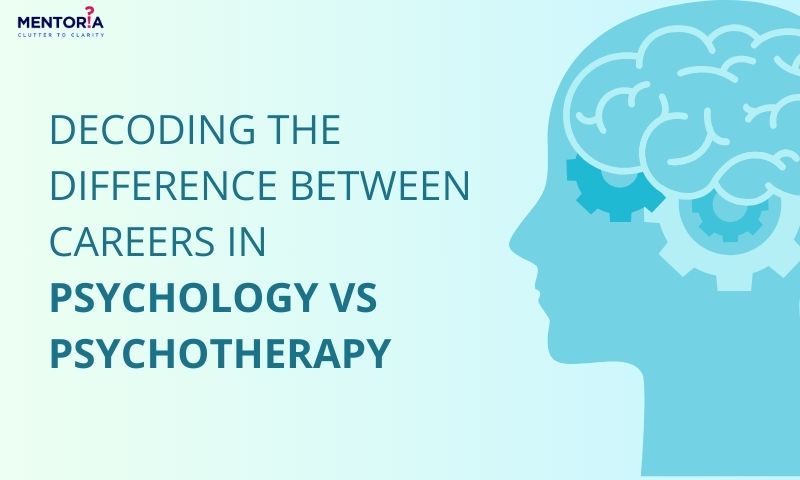Decoding The Difference Between Careers In Psychology vs Psychotherapy

So, you’re intrigued by the human mind and want to pursue a career that involves thoughts, emotions, and behaviours. Great choice! But here’s the confusion: should you pursue psychology or psychotherapy? Both paths are fascinating and rewarding, but they come with distinct roles, training, and career trajectories. Let’s get into the nitty-gritties about both careers to decide which one could be perfect for you.
What Is Psychology?
Psychology is the broad study of the mind and behaviour. Think of psychologists as people investigating why we think, feel, and act the way we do. They work in diverse fields—clinical, cognitive, developmental, and even forensic psychology. A 2023 study in the Indian Journal of Psychological Medicine highlighted a 20% increase in demand for clinical psychologists over the past five years, driven by growing awareness of mental health issues. Here’s why you should pursue psychology:
- Wide Scope: Psychologists can specialise in various areas, such as clinical, cognitive, or social psychology.
- Research-Oriented: Many psychologists focus on research to understand mental processes and behaviours.
- Educational Path: Typically, a career in psychology requires a master’s or doctoral degree.
- Work Settings: Psychologists can be found in universities, research labs, corporate offices, and hospitals.
What Is Psychotherapy?
Psychotherapy is a treatment method used to help people manage and overcome mental health issues. Psychotherapists are like mental health coaches, guiding individuals through their emotional and psychological challenges using various therapeutic techniques. According to the Indian Journal of Psychiatry, there has been a 25% rise in the need for psychotherapists, particularly in urban areas, due to increasing stress levels and mental health awareness. Here’s why you should pursue psychotherapy:
- Focused on Treatment: Psychotherapists work directly with clients to improve their mental health.
- Therapeutic Techniques: They use methods such as cognitive-behavioural therapy (CBT), psychoanalysis, and more.
- Educational Path: Becoming a psychotherapist often requires specialised training in psychotherapy after obtaining a degree in psychology or a related field.
- Work Settings: Psychotherapists commonly work in private practices, mental health clinics, and hospitals.
The Academic Pathway
Choosing between psychology and psychotherapy involves understanding the educational pathways for each.
Psychology Path
- Undergraduate Degree: Bachelor’s in psychology or related field.
- Graduate Degree: Master’s or Ph.D. in psychology.
- Licensing: Required for clinical practice and varies by region.
Psychotherapy Path
- Undergraduate Degree: Bachelor’s in psychology, social work, or related field.
- Specialised Training: Postgraduate diploma or master’s in psychotherapy.
- Licensing: Necessary for practice and varies by region.
What Industries Can You Work In?
Both fields offer exciting career opportunities, but the roles can differ significantly.
Psychology Careers
- Clinical Psychologist: Diagnose and treat mental health issues.
- Researcher: Conduct studies on behaviour and mental processes.
- Industrial-Organisational Psychologist: Improve workplace productivity and culture.
- Forensic Psychologist: Work within the legal system to assess and treat criminals.
Psychotherapy Careers
- Clinical Psychotherapist: Provide therapy to individuals, couples, or groups.
- Counsellor: Work in schools, colleges, or community centres offering guidance.
- Family Therapist: Help families navigate and resolve conflicts.
- Art Therapist: Use creative arts to aid emotional expression and healing.
Skills That Will Help You Thrive
Success in either field requires a unique set of skills and qualities.
Psychologists
- Analytical Thinking: Ability to analyse complex data and research findings.
- Communication: Clearly presenting research and findings.
- Empathy: Understanding and relating to clients’ experiences.
- Patience: Research and therapy can be slow processes.
Psychotherapists
- Active Listening: Attentively listening to clients without judgement.
- Emotional Intelligence: Managing and understanding one’s own and clients’ emotions.
- Problem-Solving: Developing strategies to help clients overcome challenges.
- Resilience: Dealing with emotional stories and maintaining personal well-being.
Salary Expectations
Understanding the financial prospects can help you decide which path to pursue. In India, salaries can vary widely based on experience, location, and specialisation.
- Entry-Level: INR 3,00,000 – INR 5,00,000 per annum.
- Mid-Career: INR 5,00,000 – INR 10,00,000 per annum.
- Experienced: INR 10,00,000 – INR 20,00,000 per annum.
- Entry-Level: INR 2,50,000 – INR 4,50,000 per annum.
- Mid-Career: INR 4,50,000 – INR 8,00,000 per annum.
- Experienced: INR 8,00,000 – INR 15,00,000 per annum.
Choosing Your Path
So, whether you’re drawn to the investigative world of psychology or the hands-on approach of psychotherapy, both careers offer rich opportunities and fulfilling experiences. Your choice ultimately depends on your interests, skills, and how you envision making a difference in the mental health field.
At Mentoria, we’re here to guide you through this exciting journey. Our career counselling services provide personalised guidance to help you choose the right path, whether it’s psychology or psychotherapy. With Mentoria, you’ll have access to expert advice, resources, and support to kickstart your career in mental health.










